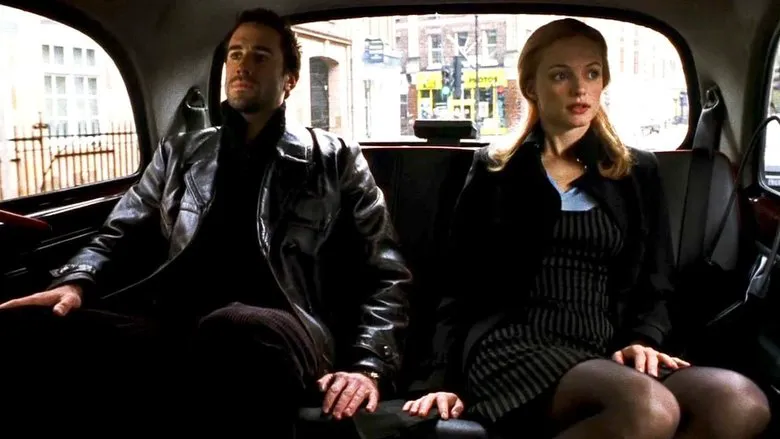Decoding “Kill Me Softly”: A Western Lens on Eastern Sensibilities
Many critics have panned Chen Kaige’s Hollywood debut, “Kill Me Softly,” as a complete disaster. They argue that the erotic thriller genre is inaccessible to Eastern sensibilities, demanding a self-awareness and humor that they believe is absent in Chinese cinema. Some even claim that the film exposes the supposed lack of talent in actor Joseph Fiennes. But is it fair to blame Chen Kaige for Fiennes’ performance, when his perceived “awfulness” was overlooked in “Shakespeare in Love” due to its Oscar-winning status and self-deprecating humor? Perhaps “Kill Me Softly” is simply a subtle, Eastern-style satire that Western audiences are not accustomed to, causing them to laugh in the wrong places.
How can one argue against such an interpretation when Chen’s name is misspelled as “Cage” in the credits, despite the translator surely knowing that Nicolas Cage is the Hollywood actor? Let’s imagine that the renowned Chinese director approached Hollywood with curiosity rather than vanity or greed. He’s not naive, but cynicism is not an Eastern trait. The question then becomes: where does filmmaking begin when one returns to its roots? Chen embraced the source material, Sean French’s bestselling novel, a quintessential tale of business London, a passionate affair ignited on a pedestrian crossing, a blend of intense sex and the snowy memories of a passionate climber, all culminating in a Western archetype: Charles Perrault’s “Bluebeard.” With a modest budget of $25 million, he hired the up-and-coming Joseph Fiennes, a “stud” with a good pedigree, and Heather Graham, a wide-eyed, doll-like blonde with a silicone bust. What better tools to dissect Hollywood?

Chen navigates Western life with surprising ease. When Graham breaks up with her live-in boyfriend while he’s watching football, she hears the devastating line: “I bought you a subway ticket every day. I thought we were going to get married.” The explicit sex scenes with Fiennes are also well-executed, suggesting that these Westerners have at least consulted the “Kama Sutra.” However, the declarations of love in the pouring rain force Chen to question the Western approach. The stoicism of Eastern faces could withstand both verbal and natural storms (or, conversely, accompany quiet skies with expressive gestures). Yet, these Westerners manage to express their passionate feelings under a turbulent sky, using both their faces – Fiennes with his bullish expressions, Graham with her wide-eyed gaze – to an overwhelming degree. The audience couldn’t help but chuckle at the excess.
Unraveling the Thriller
Need a thriller? Of course, there will be secret letters, hidden doors, and mysterious disappearances – whether it involves sadism or incest. Secrets abound in the East as well, usually rooted in the past, but the Eastern ethos emphasizes concealment rather than revelation. Why stir up the past? It’s enough to settle accounts with it. Nevertheless, the mechanism of someone’s ignorance is universally understood, and replacing steppe grasses with mountain avalanches, ancient swords with signal pistols, and nunchuck fights with psycholinguistic debates is a mere trifle.

In essence, Chen Kaige manages to keep the audience guessing, fearful, and nervous for two hours, maintaining a consistent rhythm and skillfully shifting the narrative’s tone. However, the audience is ultimately disappointed. No Western director would burden a film like “Basic Instinct” with such hopeless genre clichés, while “Kill Me Softly” is blatantly derivative and conformist in its approach to the “erotic thriller.” Almost every aspect of the film – the rhythm, setting, costumes, lighting, and details – feels generic. It’s as if Chen Kaige, while diligently completing the assignment, is bored and wondering why he even took on the project.
A Clash of Cultures
But perhaps the genre only seems dull to Westerners because they don’t dwell on the fact that Heather Graham is involved with a stranger. Of course, she wanted sex, and with someone new. And her quick marriage? All women want to get married. Everything that follows seems logical. How can she not suspect her husband when she receives letters and he locks away a cabinet containing more letters? How can she not realize he’s a cold-blooded killer when the author of the “other letters” disappears without a trace? Wasn’t his last girlfriend lost while climbing with him? And why is he now teaching Heather, his beloved, to climb mountains? How can she not investigate his blatant psychological sadism?

Now, imagine an Eastern person understanding all of this. Understanding that in the West, women have sex separately from their daily lives. That if she runs after him like a dog, marries him, makes him breakfast, and washes his shirts, it’s not a reason for blind trust. “Trust, but verify,” as Reagan said. What prevents her, despite their crazy passion, even after marriage, from immediately saying: “Listen, what’s with all these letters and locked cabinets? Spill it now, or there’s no dinner and you’re sleeping on the bench in the yard.” What, besides madness, can an Eastern person make of this “something,” this pathological fear of someone else, of life? Trust is the first law of harmony with the environment, with its past, parents, children, marriages, jobs, changes, and deaths. If the so-called “laws” of Hollywood genres are all built on its violation, Hollywood is engaged in self-destruction, the destruction of cinema. Chen Kaige ultimately tries to suggest that Heather Graham brought it all on herself, that she is the killer, killing time, but then the film ends. The Chinese director literally throws up his hands, and that’s his humor. “Guys, you’re sawing off the branch you’re sitting on. I’ve shown you all this, so don’t blame me.” It remains a mystery where he will go next, home or – by circumstance – to the afterlife.